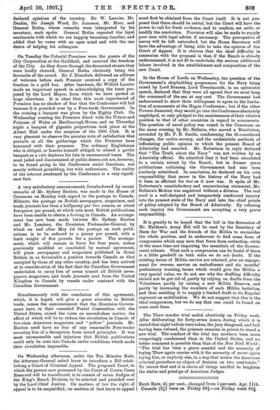In the House of Lords on Wednesday, the question of
the Government's shipbuilding programme for the Navy being raised by Lord Brassey, Lord Tweedmouth, in an optimistic speech, declared that they were all agreed that we must keep the command of the sea at any cost The Government had endeavoured to show their willingness to agree to the limita- tion of armaments at the Hague Conference ; but if the other Powers diseented, they would go into the Conference absolutely unpledged, or only pledged to the maintenance of their relative position to that of other countries in regard to armaments. The question of naval policy was raised in the Commons on the same evening by Mr. Bellaire, who moved a Resolution, seconded by Mr. F. E. Smith, condemning the ill-considered changes, the undue secrecy, and the undesirable methods of influencing public opinion to which the present Board of Admiralty had resorted. Mr. Robertson in reply declared that "The Truth about the Navy" was not written by an Admiralty official. He admitted that it had been circulated to a certain extent by the Board; but in former years publications criticising the Government had also been similarly subsidised. In conclusion, he declared on his own responsibility that never in the history of the Navy had it been as efficient for war as it now was. It spite of Mr. Robertson's unsatisfactory and unconvincing statement, Mr. Bellaire's Motion was negatived without a division. The real need is a well-designed and temperately conducted inquiry into the present state of the Navy and into the chief points of policy adopted by the Board of Admiralty. By refusing such inquiry the Government are accepting a very grave responsibility.










































 Previous page
Previous page